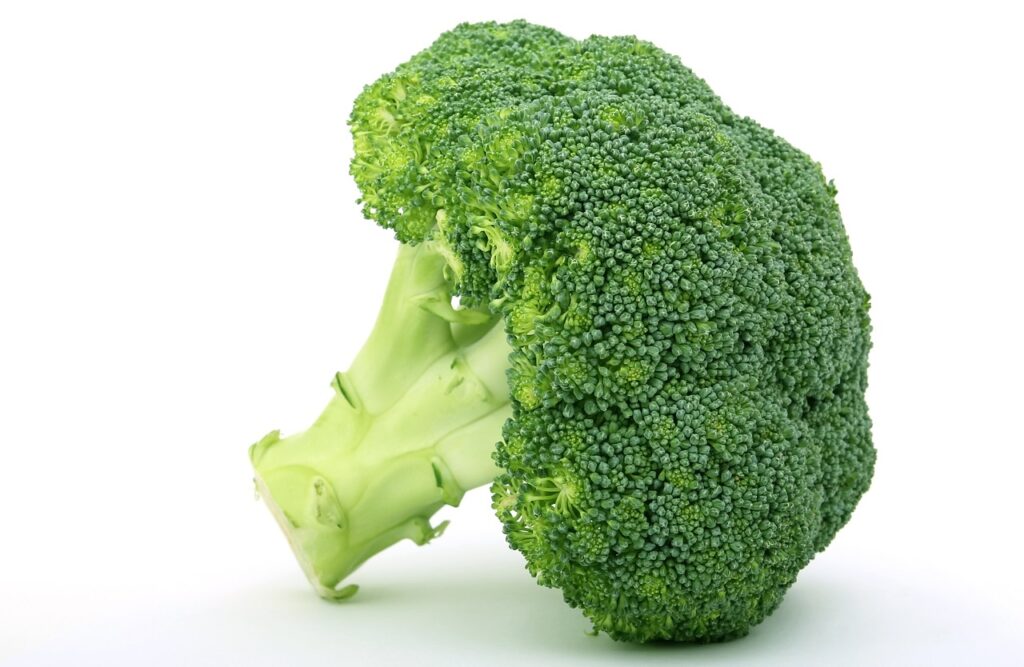|
Getting your Trinity Audio player ready...
|
Health Benefits of Broccoli

Broccoli (Brassica oleracea) is a member of the cruciferous family along with cauliflower, kale and cabbage. It has a light green stalk topped with tightly clustered dark green florets, giving it the appearance of a miniature tree. The health benefits of broccoli are many and so it should be consumed regularly as it is packed with vitamins, minerals, antioxidants and fibre.
Fresh broccoli has tightly closed and springy florets as well as thin stalks. Broccoli with flowering heads, yellowing florets or thick stems should be avoided as they indicate maturity. Fresh broccoli can be kept for up to five days when stored in the fridge, while cooked broccoli can be kept in the fridge for up to three days.
Health benefits of broccoli
The many health benefits of broccoli include:
1. Loaded With Vitamins, Minerals and Phytochemicals
Broccoli is loaded with a wide range of vitamins, minerals and bioactive phytochemicals, such as sulforaphane and various flavanoids. These phytochemicals have antioxidant, anti-inflammatory, cardio-protective, anticancer, antimicrobial, antiaging, antidiabetic and neuroprotective properties.
100g of raw broccoli contains:
- Carbohydrates: 6.64 grams
- Protein: 2.82 gram
- Fat: 0.37 grams
- Fibre: 2.6 grams
- Vitamin C: 89.2mg
- Vitamin A: 31mcg
- Calcium: 47mg
In addition to the above, broccoli also contains high levels of vitamins K and B6, folate, potassium and manganese.
Broccoli can be eaten raw or cooked but they have different nutrient profiles. The cooking method affects the nutrients found in broccoli. In fact, over cooking will result in the loss of several nutrients, especially vitamin C. Studies have shown that steaming is the best way to preserve broccoli’s nutrients
2. Rich in Powerful Antioxidants
Broccoli contains high levels of antioxidants which are very beneficial for health. They neutralise harmful free radicals thus preventing oxidative stress and preventing cell damage.
Broccoli also contains high levels of glucoraphanin, a phytochemical which is converted during digestion into the powerful antioxidant sulforaphane. Studies have shown that sulforaphane has antioxidant, anti-inflammatory, anticancer, antimicrobial, anti-aging, anti-diabetic and neuroprotective properties. In addition, it helps to lower blood sugar and cholesterol levels and prevent the development of chronic disease.
Brocolli also contains the flavonoids kaempfrol and quercetin which add to the cardio-protective, anti-inflammatory and anticancer properties of broccoli. In addition, broccoli contains the antioxidants lutein and zeaxanthin, which may prevent macular degeneration, the most common cause of blindness in adults. These powerful antioxidants are responsible for some of the most profound health benefits of broccoli.
3. Contains Powerful Anti-inflammatory Phytochemicals
Broccoli contains bioactive phytochemicals which have powerful anti-inflammatory effects in the body. Various studies published in the Preventive Nutrition and Food Science Journal suggest that regular consumption of broccoli can reduce chronic inflammation, Chronic inflammation is associated with an increased risk of various chronic diseases, such as heart disease, premature aging and even cancer.
The most powerful anti-inflammatory agent found in broccoli is the phytochemical sulforaphane. Studies have shown that sulforaphane helps reduce the inflammation markers in laboratory tests and so therefore reduces chronic inflammation. According to the Journal of Medicinal Foods, it blocks nucleotide factor NF-κB which is a pro-inflammatory signalling pathway. Blocking this pathway reduces inflammation and, in fact, certain anti-inflammatory drugs target this pathway.
Broccoli also contains high levels of the flavonoid kaempferol. This helps the body fight allergies and inflammation. These anti-inflammatory properties also boost your immune system, helping you fight off bacteria and viruses
4. May Reduce the Risk of Cancer
Cruciferous vegetables such as broccoli and cauliflower contain substantial quantities of isothiocyanate antioxidants some of which (e.g., sulforaphane or 4-methylsulfinylbutyl isothiocyanate) are very potent inducers of phase 2 enzymes. Phase 2 enzymes are major detoxification enzymes and an important part of cellular defence against carcinogens, oxidants, and other toxic chemicals. The cancer-preventive role of many phase 2 enzymes has been well documented.
Various studies in the Cancer Treatments Review show that cruciferous vegetables, including broccoli, contain several phytochemicals which may have anti-cancer properties. These phytochemicals may neutralise carcinogens and prevent cancerous cells from growing and spreading. In fact, various studies have shown that broccoli (and other cruciferous vegetables) may reduce the risk of certain cancers such as breast, colon, stomach and prostate cancer.
Larger studies are required in order to study the relationship between cruciferous vegetables and cancer prevention.
5. Improved Blood Sugar Control
Eating broccoli regularly may improve diabetic control. Studies have shown that the antioxidants in broccoli, particularly sulforaphane and kaempfrol, may reduce insulin resistance in type 2 diabetics. This increases the activity of insulin at its receptors leading to improved blood sugar control.
In addition, broccoli has a high fibre content. Eating a high fibre diet reduces the rate of absorption of glucose from the gastrointestinal tract, thus reducing the spikes of the blood sugar level after meals. This leads to lower blood sugar levels and improved diabetic control.
6. May Improve Cardiovascular Health
In addition to the powerful antioxidants found in broccoli, the high fibre content helps to reduce LDL (or bad cholesterol) levels and keep the heart functioning properly. Various studies have found that people who took a powdered broccoli sprout supplement had significantly reduced levels of LDL and triglycerides, as well as an increased HDL (or good cholesterol) levels. The powerful antioxidant phytochemicals neutralise harmful free radicals and so prevent oxidative stress, thus reducing the risk of chronic disease, including heart disease.
Furthermore, increasing the intake of fibre-rich foods such as broccoli is associated with a reduced risk of heart disease. Studies have shown that the fibre combines with bile making it much easier to excrete. It has been found that reducing the amount of bile in the body results in a significant reduction of cholesterol levels, thereby helping your heart health..
7. May Help Maintain a Healthy Digestive System
Broccoli is rich in both fibre and antioxidants both of which prevent constipation and contribute to digestive health. In the gastrointestinal tract fibre absorbs water and expands. This increases the stool bulk which stimulates peristalsis (gut contractions) and which in turn prevents constipation.
Along with kaempferol, fibre also helps to keep the stomach lining healthy and helps to maintain sufficient levels of the healthy bacteria in the intestines. The vitamins and magnesium found in broccoli reduce acidity, aid proper digestion, and help in the absorption of nutrients from the other foods.
People suffering from inflammatory bowel disease (Crohn’s or ulcerative colitis) as well as diverticulitis, should avoid fibre as it can cause flare-ups.
8. May Boost Brain Health
Broccoli may help to boost cognition and memory and slow mental decline as it is rich in vitamin K and choline. In addition to this, sulforaphane can also help to prevent the onset of Alzheimer’s and many other neurodegenerative diseases.
A study in 960 older adults revealed that one daily serving of dark green vegetables, such as broccoli, may help resist mental decline associated with aging.
Most current research evaluating the effect of bioactive compounds found in broccoli on brain health are restricted to animal studies. More research is needed to determine how these compounds support neurological function in humans.
9. May Help Slow the Aging Process
Broccoli can help slow the aging process with the help of nicotinamide mononucleotide (NMN). This is a compound found in broccoli which promotes the production of a compound that stimulates metabolism and thus prevents genetic changes which lead to premature aging. Antioxidants such as vitamin A, vitamin C, and collagen also play a key role in delaying aging.
Broccoli boosts skin health and gives a glowing, healthy, and radiant appearance. This is due to the antioxidants found in broccoli such as, beta-carotene, vitamin A, C, E and K, vitamin B complex, amino acids, and folate.
In addition, the powerful antioxidants found in broccoli may protect against UV radiation damage which can lead to wrinkle formation, and in extreme cases, skin cancer
10. Strengthens the immune system
Broccoli gets its green or purple colour from antioxidants such as vitamin C, beta-carotene, selenium, copper, choline, zinc and phosphorus. These nutrients are powerful immune system boosters which help to protect you from numerous infections.
Vitamin C is one of the most important nutrients for immune function and broccoli contains very high levels of it. In fact, 100-200 mg of vitamin C daily is sufficient to prevent certain infections.
11. May Support Dental and Oral Health
The wide range of nutrients found in broccoli may help prevent dental disease and help to maintain oral health. The flavonoid antioxidant kaempferol found in broccoli may help to prevent periodontitis, whereas the high levels of vitamin C and calcium reduce the risk of periodontal disease.
In addition, various studies have shown that sulforaphane may help reduce the risk of developing oral cancers.
12. May Help Maintain Healthy Bones and Joints
Broccoli keeps the bones and teeth strong as it is rich in vitamin K, calcium, magnesium, zinc, and phosphorus. Eating this vegetable can be very beneficial, particularly for children, the elderly, and pregnant or lactating women. Vitamin K is essential for the formation of osteocalcin, which is a protein only found in bones.
13. May Help Maintain Eye Health
Carotenoids such as zeaxanthin, beta-carotene, and phosphorus, and other vitamins such as vitamin A, B complex, C, and E found in broccoli are very good for eye health. These substances protect the eyes against macular degeneration (the main cause of blindness in the elderly) and cataracts, while also repairing the damage caused by UV radiation.
Summary
Broccoli is a nutrient-rich vegetable which contains a range of vitamins and minerals as well as powerful phytochemicals. The health benefits of broccoli are profound and include boosting immunity, preventing mental decline, improved blood sugar control and maintaining cardiovascular health. Broccoli should therefore be regularly included in a health balanced diet.
